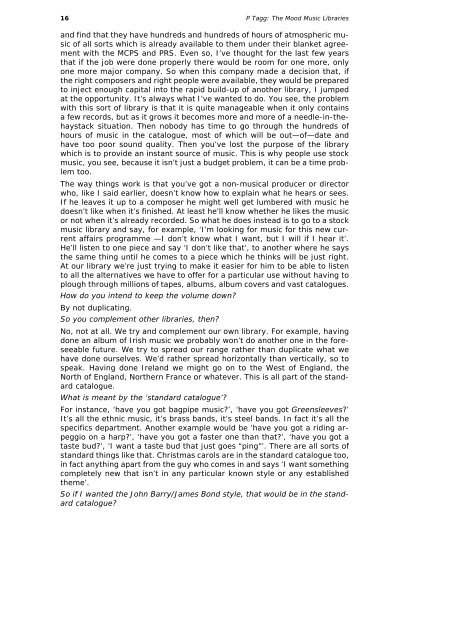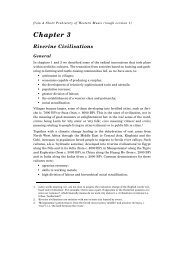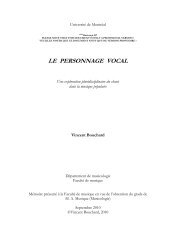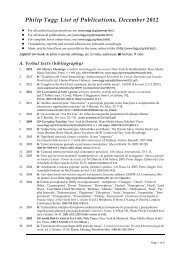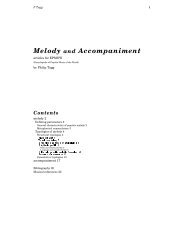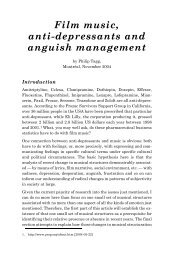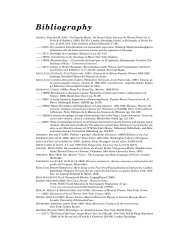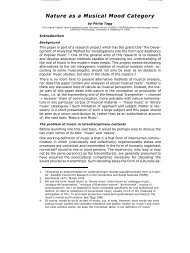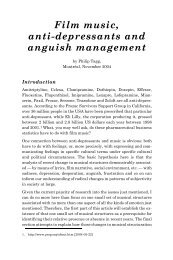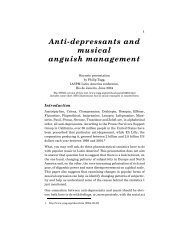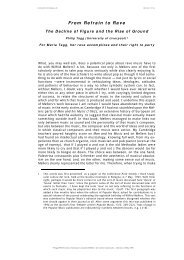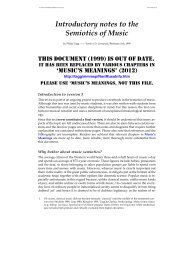interviews with library music producers - Philip Tagg
interviews with library music producers - Philip Tagg
interviews with library music producers - Philip Tagg
You also want an ePaper? Increase the reach of your titles
YUMPU automatically turns print PDFs into web optimized ePapers that Google loves.
16 P <strong>Tagg</strong>: The Mood Music Libraries<br />
and find that they have hundreds and hundreds of hours of atmospheric <strong>music</strong><br />
of all sorts which is already available to them under their blanket agreement<br />
<strong>with</strong> the MCPS and PRS. Even so, I’ve thought for the last few years<br />
that if the job were done properly there would be room for one more, only<br />
one more major company. So when this company made a decision that, if<br />
the right composers and right people were available, they would be prepared<br />
to inject enough capital into the rapid build-up of another <strong>library</strong>, I jumped<br />
at the opportunity. It’s always what I’ve wanted to do. You see, the problem<br />
<strong>with</strong> this sort of <strong>library</strong> is that it is quite manageable when it only contains<br />
a few records, but as it grows it becomes more and more of a needle-in-thehaystack<br />
situation. Then nobody has time to go through the hundreds of<br />
hours of <strong>music</strong> in the catalogue, most of which will be out—of—date and<br />
have too poor sound quality. Then you’ve lost the purpose of the <strong>library</strong><br />
which is to provide an instant source of <strong>music</strong>. This is why people use stock<br />
<strong>music</strong>, you see, because it isn’t just a budget problem, it can be a time problem<br />
too.<br />
The way things work is that you’ve got a non-<strong>music</strong>al producer or director<br />
who, like I said earlier, doesn’t know how to explain what he hears or sees.<br />
If he leaves it up to a composer he might well get lumbered <strong>with</strong> <strong>music</strong> he<br />
doesn’t like when it’s finished. At least he’ll know whether he likes the <strong>music</strong><br />
or not when it’s already recorded. So what he does instead is to go to a stock<br />
<strong>music</strong> <strong>library</strong> and say, for example, ‘I’m looking for <strong>music</strong> for this new current<br />
affairs programme —I don’t know what I want, but I will if I hear it’.<br />
He’ll listen to one piece and say ‘I don’t like that’, to another where he says<br />
the same thing until he comes to a piece which he thinks will be just right.<br />
At our <strong>library</strong> we’re just trying to make it easier for him to be able to listen<br />
to all the alternatives we have to offer for a particular use <strong>with</strong>out having to<br />
plough through millions of tapes, albums, album covers and vast catalogues.<br />
How do you intend to keep the volume down?<br />
By not duplicating.<br />
So you complement other libraries, then?<br />
No, not at all. We try and complement our own <strong>library</strong>. For example, having<br />
done an album of Irish <strong>music</strong> we probably won’t do another one in the foreseeable<br />
future. We try to spread our range rather than duplicate what we<br />
have done ourselves. We’d rather spread horizontally than vertically, so to<br />
speak. Having done Ireland we might go on to the West of England, the<br />
North of England, Northern France or whatever. This is all part of the standard<br />
catalogue.<br />
What is meant by the ‘standard catalogue’?<br />
For instance, ‘have you got bagpipe <strong>music</strong>?’, ‘have you got Greensleeves?’<br />
It’s all the ethnic <strong>music</strong>, it’s brass bands, it’s steel bands. In fact it’s all the<br />
specifics department. Another example would be ‘have you got a riding arpeggio<br />
on a harp?’, ‘have you got a faster one than that?’, ‘have you got a<br />
taste bud?’, ‘I want a taste bud that just goes “ping”’. There are all sorts of<br />
standard things like that. Christmas carols are in the standard catalogue too,<br />
in fact anything apart from the guy who comes in and says ‘I want something<br />
completely new that isn’t in any particular known style or any established<br />
theme’.<br />
So if I wanted the John Barry/James Bond style, that would be in the standard<br />
catalogue?


